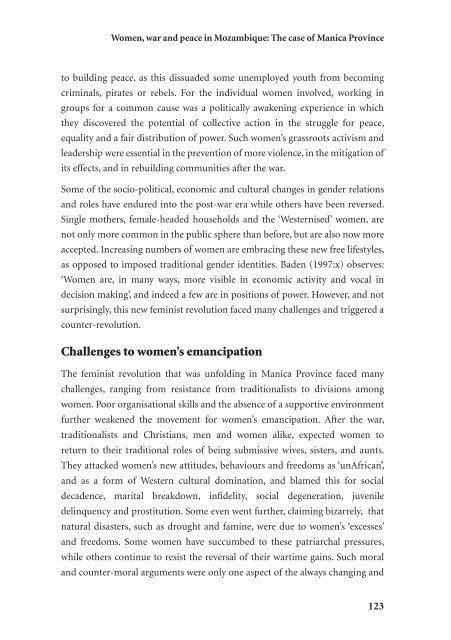ACCORD-ajcr-2015-1
ACCORD-ajcr-2015-1
ACCORD-ajcr-2015-1
- No tags were found...
You also want an ePaper? Increase the reach of your titles
YUMPU automatically turns print PDFs into web optimized ePapers that Google loves.
Women, war and peace in Mozambique: The case of Manica Province<br />
to building peace, as this dissuaded some unemployed youth from becoming<br />
criminals, pirates or rebels. For the individual women involved, working in<br />
groups for a common cause was a politically awakening experience in which<br />
they discovered the potential of collective action in the struggle for peace,<br />
equality and a fair distribution of power. Such women’s grassroots activism and<br />
leadership were essential in the prevention of more violence, in the mitigation of<br />
its effects, and in rebuilding communities after the war.<br />
Some of the socio-political, economic and cultural changes in gender relations<br />
and roles have endured into the post-war era while others have been reversed.<br />
Single mothers, female-headed households and the ‘Westernised’ women, are<br />
not only more common in the public sphere than before, but are also now more<br />
accepted. Increasing numbers of women are embracing these new free lifestyles,<br />
as opposed to imposed traditional gender identities. Baden (1997:x) observes:<br />
‘Women are, in many ways, more visible in economic activity and vocal in<br />
decision making’, and indeed a few are in positions of power. However, and not<br />
surprisingly, this new feminist revolution faced many challenges and triggered a<br />
counter-revolution.<br />
Challenges to women’s emancipation<br />
The feminist revolution that was unfolding in Manica Province faced many<br />
challenges, ranging from resistance from traditionalists to divisions among<br />
women. Poor organisational skills and the absence of a supportive environment<br />
further weakened the movement for women’s emancipation. After the war,<br />
traditionalists and Christians, men and women alike, expected women to<br />
return to their traditional roles of being submissive wives, sisters, and aunts.<br />
They attacked women’s new attitudes, behaviours and freedoms as ‘unAfrican’,<br />
and as a form of Western cultural domination, and blamed this for social<br />
decadence, marital breakdown, infidelity, social degeneration, juvenile<br />
delinquency and prostitution. Some even went further, claiming bizarrely, that<br />
natural disasters, such as drought and famine, were due to women’s ‘excesses’<br />
and freedoms. Some women have succumbed to these patriarchal pressures,<br />
while others continue to resist the reversal of their wartime gains. Such moral<br />
and counter-moral arguments were only one aspect of the always changing and<br />
123


